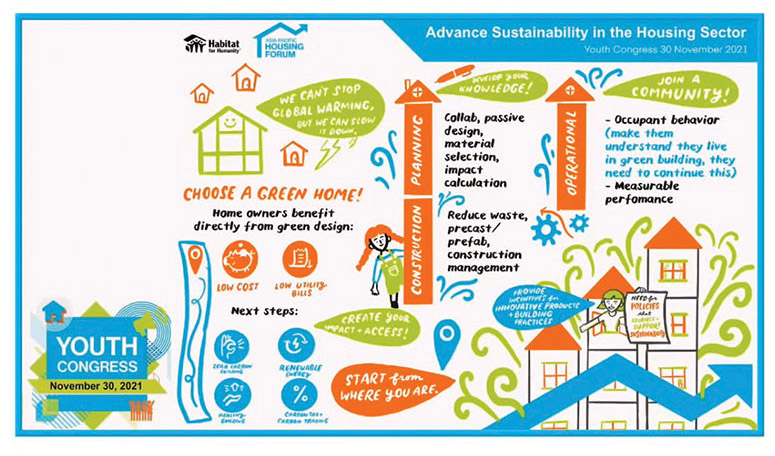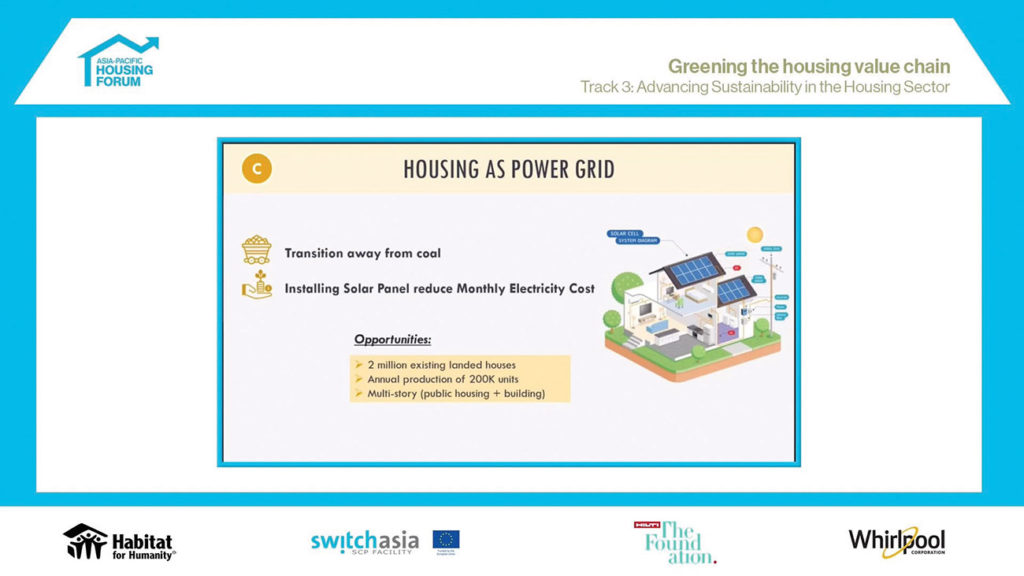1st Quarter 2022
Mainstreaming Green throughout the housing value chain
March 16, 2022
The 8th Asia-Pacific Housing Forum (APHF) was held to strengthen international commitments on housing as informed by climate change and SDGs. It was organised by Habitat for Humanity, in partnership with the EU SWITCH-Asia SCP (Sustainable Consumption and Production) Facility, and hosted in Bangkok, Thailand with a virtual global audience from 7–9 December 2021. Among the objectives of the forum discussed was to build collaboration between organisations with the capacity to scale up the low-cost affordable housing sector in Asia-Pacific.
Financing affordable housing in cities
Dao Harrison, Senior Housing Specialist at the World Bank, noted: “We need to think about many different solutions for many different stakeholders along the entire value chain.” In the presentation that discussed the case study of Indonesia’s 1-million housing programme, Harrison detailed three aspects that are in place:
• Credit-linked subsidy at 5 per cent interest rate loan, which aims to tackle the backlog of home ownership at 220,000 units per year;
• Grant for upgrade, considering a home upgrading backlog of 160,000 units per year for structures that have passed their service life period;
• Public rental housing, with a backlog of 11,000 units per year, which are 100 per cent funded by the government of Indonesia.
Resiliency against risk
Many actors across the real estate ecosystem need to be engaged in the effort to realise housing for all: investment and advisory programmes for banks and for the building sector; Green indexes through scalable and voluntary rating systems; and working alongside governments to establish public sector codes and incentives through policy and regulation.
According to Angelo Tan, Country Lead for the Philippines’s EDGE and Building Resiliency Index (BRI) at the International Finance Corporation (IFC), there are various drivers of feasibility for Green affordable housing: Access to international Green finance flows for better financing terms; minimised incremental cost through early planning; faster sales and market differentiation; savings on utility costs for owners and renters; lowered default rates and superior collateral value; and government incentives, both financial and non-financial.
Strengthening actors in construction and demolition

The high rate of demolition in Mongolia is related to other social and environmental problems, such as urban air pollution. chinahbzyg/Shutterstock.com

Jana Zilkova
It is easy to grasp the construction process as an impactful target for Green efforts in housing provision, but the other side of the coin often escapes attention. Demolition is usually seen as an opposite to construction to produce a ‘clean slate’ for new developments; however, when considering the amount of energy needed and the waste that results from tearing down a building, the damage on the environment is severe.
A case study in the rapidly developing context of Mongolia states how more than 80 per cent of all construction and demolition waste (CDW) had been dumped illegally outside of designated landfills. This amount represents up to a quarter of overall solid waste, making it one of the largest waste streams in the country. Jana Zilkova, Head of Mission of the NGO Caritas Czech Republic, shared about the project called Recycling Building Materials between 2016-2021 to improve waste management, beginning from the housing sector. The objective was to contribute to poverty reduction and mitigation of climate change through supporting small-and-medium enterprises, state institutions, academia and urban residents in switching to more resource-efficient practices.
The voice of youth in reshaping housing
As a side event of the forum, the Youth Congress—a platform for persons aged 15 to 30 years old—drafted a statement about building forward better for inclusive housing, based on a virtual survey held prior to and during the event. The statement was presented alongside illustrated drawings at the Closing Plenary by Mazidatun Maftukhan as part of the UN Major Group for Children and Youth. “Homelessness is more than just the lack of a roof over one’s head—human-centred approaches can help us truly understand needs”, reads the first statement.
Some of the observations included how there is an apparent imbalance of resource distribution in terms of housing: “So many abandoned houses, yet homes in Tokyo keep getting smaller and smaller!” Stating the need to redouble commitments to the progressive realisation of the right to adequate housing, Maftukhan concluded: “We are excited about the future … we, young people, are the present. We must develop a deep sense of focus on people-centred solutions and not forget about affordable housing for all.”
Innovating for impact
To reward and demonstrate the importance of strategic collaboration in the field, especially in people-public-private partnerships, APHF bestowed Innovation Awards to products and services related to affordable housing that addressed real needs in providing disaster-resilient, inclusive and sustainable solutions.
In the category of ShelterTech, the award was presented to Sampangan Indonesia for processing waste into affordable prefabricated building materials. Muhammad Fauzal Rizki, CEO and Co-Founder of Sampangan, wanted to address widespread problems: “Fifty per cent of the Indonesian population do not have access to proper homes; some of them build a house by themselves, resulting in fire hazards and being at risk of natural disasters.” Sampangan’s system takes legacy waste from landfills without needing to sort between organic and inorganic waste, then processes it into activated carbon to be made into safe, good-quality carbon concrete.
READ MORE: Carbon Tech Modular House by Sampangan in Indonesia
The lack of proper housing is an urgent problem for the Indian state of Odisha, where over 1.7 million people currently reside in almost 3,000 slums spread across 114 cities, lacking proper living conditions, including sanitation and water, while being in constant threat of eviction. The Housing and Urban Development Department of Odisha, through the Jaga Mission that won the award in the category of Public Policies, plans to resolve this within a rapid timeframe. The mission aims to empower slum dwellers with land rights through a land titling and upgrading initiative.
Using various development schemes and funding sources, the upgrading work is executed in partnership with dweller associations and only considered finished when the slum dwellers have verified the infrastructure development according to the checklist. Within the first seven months of the pilot phase, 550 slums across the state had been upgraded. The process is being scaled up across all cities and is expected to be completed by December 2022.
Another award-winning programme in the category of Inspirational Practices will also be rolled out in Odisha among other places in India: The LaRaksha Social Impact Trust for Roofing Loan. “A roof is the most vulnerable part of the house [against natural elements] and it determines the overall habitat quality of families. Damage to the roof causes problems of unhygienic living conditions and sickness … Families in vulnerable regions need to repair their roofs every year, frittering away their savings and are frequently pushed below the poverty line,” explained Ramesh Kumar, President of LaRaksha.

Before: the old thatched roof was in need of repair 
After: through the LaRaksha loan, the roof was upgraded with durable and safe materials
More than just replacing a damaged roof, the loan comprises a package of financial, technical and knowledge interventions using good-quality and sustainable materials. It especially targets people who are ‘in the middle’: scarcely above the poverty line and not eligible for full-fledged housing loans, but at the same time, do not have residual income to spend on housing repairs. Within the next five years, around 50,000 households are targeted to achieve financial inclusion through this initiative.
[This is an excerpt. Subscribe to the digital edition or hardcopy to read the complete article.]
Read more stories from FuturArc 1Q 2022: Housing Asia!

To read the complete article, get your hardcopy at our online shop/newsstands/major bookstores; subscribe to FuturArc or download the FuturArc App to read the issues!
Previously Published Happening
Contact us at https://www.futurarc.com/contact-us for older articles.


